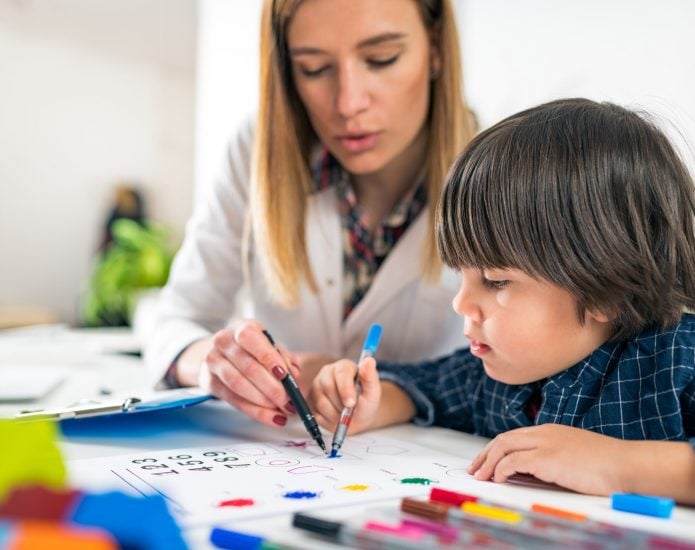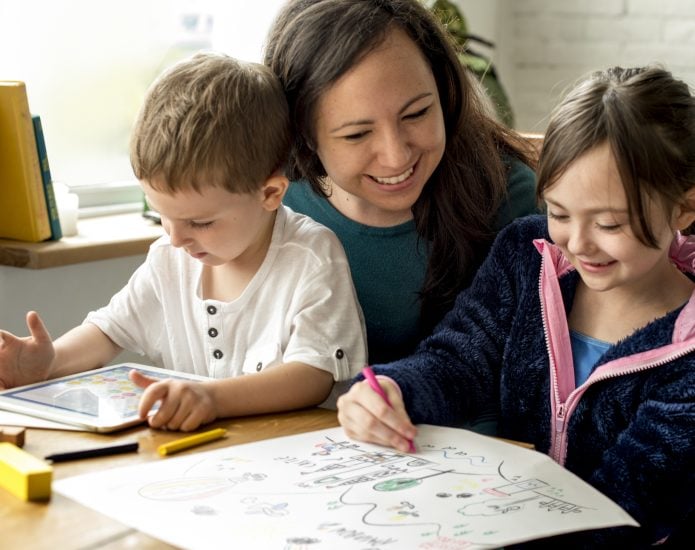It’s a normal part of a child’s emotional development to display challenging behaviours and show signs of anger and irritability. As children come to better understand their emotions they learn to regulate their behaviours when they experience them. If a child’s disruptive, defiant and hostile behaviour consistently impacts on their family, social and educational activity, they may be showing signs of oppositional defiant disorder (ODD). Children with ODD need additional support to help them build skills to cope and thrive.
What is ODD?
Oppositional defiant disorder (ODD) is a childhood behaviour disorder characterised by a persistent pattern of disobedient, hostile and disruptive behaviours toward figures of authority. Children with ODD have a well-established pattern of behaviour problems that are more extreme than their peers. One way to distinguish between typical disruptive behaviour and ODD is how severe the behaviour is and how long it lasts. Some children with ODD struggle with disruptive behaviour in school, but it isn’t uncommon for a child to only struggle at home with family members.
It’s estimated that around one in 10 children under the age of 12 years have ODD. Diagnosis of ODD is twice as likely in boys than in girls.
Signs of ODD in Children
The signs of ODD in children can be difficult to distinguish from regular developmental behaviours, particularly in the preschool and adolescent years. Children with ODD display negative, defiant behaviours and angry moods frequently in a way that interferes with daily activities.
Characteristics of oppositional defiant disorder may include:
- Frequently losing their temper,
- Easily angered, annoyed or irritated,
- Constantly arguing with authority figures, particularly familiar adults in their lives such as parents,
- Refusing to follow rules or requests from authority figures,
- Deliberately annoying people,
- Blaming others for any accidents or bad behaviour,
- Being spiteful, vindictive or unkind.
How is ODD Diagnosed?
ODD is typically diagnosed around primary school age once a child engages with other authority figures such as teachers.
If your child is showing signs of ODD, the first step is to talk with your GP who can provide a referral to a psychologist, psychiatrist or other mental health professional for assessment. There is no single psychological test to diagnose ODD so a mental health professional will perform a comprehensive assessment that involves a range of methods and tools to gather information.
A typical assessment includes:
- Detailed interviews with the child (if appropriate), parents and teachers
- Direct observation of the child in a range of settings
- Assessment tools and activities
- Comparison of the child’s behaviours against the diagnostic criteria outlined in the Diagnostic and Statistical Manual of Mental Disorders (DSM-5-TR)
A comprehensive assessment is necessary as some children may only display ODD behaviours in one setting, most often the home, which means the signs may not be obvious when meeting with a professional. When performing an assessment, clinicians will evaluate the frequency, intensity, and duration of a child’s symptoms, as well as the impact of their symptoms in a range of environments.
For a formal diagnosis of ODD to be made, a child must frequently display at least four of the symptoms listed above for at least six months and involving at least one individual who is not a sibling.
Early diagnosis is essential. Early identification and intervention can help children with ODD avoid negative outcomes such as school failure, strained relationships and deflated confidence. It can also help to prevent the development of conduct disorder (CD), which characterised by more violent and delinquent behaviours.
Support Options for Children
The most effective support for ODD in children is one that is tailored to the individual needs of the child. Often this will involve a multi-modal approach that includes parents, teachers, and medical and mental health professionals.
Parents and carers play a significant role in the support process and management of their child’s ODD behaviours. An important first step is for parents and carers to understand that the child will behave in challenging ways and to prioritise building and repairing the relationship between the child and their family.
Working with a psychologist to develop a behaviour management plan can help to identify strategies to manage the child’s behaviour and certain triggering situations. A psychologist can also help children develop the social, emotional, and behavioural skills they need to thrive.
An effective behaviour management plan will help your child with ODD to:
- Understand how their behaviour affects other people,
- Learn to problem solve, and deal with anger and anxiety,
- Improve their social skills and communication with peers.
A behaviour management plan may also include parental training and family therapy to help families understand and cope with a child’s challenging behaviours, learn strategies to promote positive behaviours and strengthen family relationships.
Other supports include training parents and teachers to use appropriate behavioural and academic interventions at school and at home, accommodating the child in the classroom and possibly providing medication, counselling and social skills training.
Causes of ODD in Children
The cause of oppositional defiant disorder is unknown however, contributing causes may be a combination of developmental and environmental factors.
Developmental problems may cause ODD, or the behaviours may be learned.
- Developmental factors include a child’s natural temperament or possibly neurobiological differences in the way nerves and the brain function.
- Environmental factors include learned behaviours that may be caused by inconsistent or harsh discipline, lack of supervision, marital conflict in their family, abuse or neglect
Children with ODD often have other difficulties like learning disabilities, ADHD (attention deficit hyperactivity disorder), anxiety, mood disorders, or language impairment.
There is a very high co-occurrence of ADHD and ODD in children. Children who have ADHD are inclined to be disruptive and impulsive, which often causes problems with authority figures who have certain behaviour expectations. Repeated patterns of negative interactions with parents and other authority figures can lead to a child developing ODD.
How Can Parents Best Help Children with ODD?
Your child will get the most success from their behaviour management plan when all the authority figures in their life work together. This includes parents/carers, mental health professionals and teachers. Having specific strategies that can be used at home and school to support and reinforce your child’s therapy is very important.
Parent-management training programs are also important. These programs help to teach parents how to manage their child’s behaviour. They specifically focus on positive reinforcement methods and how to best discipline your child.
Some strategies for working on your child’s ODD behaviour at home include:
- Acknowledging your child’s strong emotions and letting them know you’re there to listen and help.
- Praising positive behaviour.
- Implementing a reward system like a reward chart. This works especially well for younger children aged 3-8 years.
- Giving short, direct and specific instructions so they know exactly what you expect from them.
- Responding to negative behaviour straight away. If they continue to be uncooperative, be ready with a consequence like no screen time for the rest of the day.
- Being consistent with discipline so your child knows what to expect if and when they misbehave
- Giving choices about when your child can do tasks, not whether your child will do them – for example, ‘Would you like to put your clothes away now, or after your bath?’
Your child needs to know they’re important to you and one of the best ways you can show them this is by spending quality time with them.
How Learning Links Can Help
Learning Links has programs and resources to help parents better understand and support challenging behaviours.



